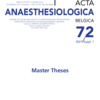Intraoperative cell salvage in oncological surgery: a narrative review
Neoplasms; operative blood salvage; blood transfusion; autologous
Published online: Apr 21 2022
Abstract
Background: Patient Blood Management (PBM) guidelines recommend intra-operative cell salvage (ICS) as a blood conservation strategy. In oncological surgery, however, many anesthesiologists and surgeons remain reluctant to use ICS for fear of causing systemic metastasis of tumor cells.
Objective: To review the efficacy and safety of ICS in oncological surgery.
Methods: MEDLINE, Embase and the Cochrane Library were searched for relevant articles from January 1st , 1986 until April 1st , 2021 using the keywords: “neoplasm”, “cancer”, “tumor”, “tumour”, “allogeneic blood transfusions”, “autologous blood transfusions”, “cell saver”, “intraoperative cell salvage”, “leukocyte depletion filter”
Results: Allogeneic blood transfusion is associated with several direct and indirect risks. As suggested by PBM-guidelines, it may therefore be prudent to restrict allogeneic blood transfusions. ICS offers an effective alternative to reduce allogeneic blood transfusion. Several systematic reviews and meta-analyses of observational studies suggest that ICS is not associated with metastasis, tumor recurrence or worse outcome after cancer surgery. Randomized controlled trials investigating its safety are however lacking. In light of the risks of allogeneic blood transfusion, the use of ICS should be considered in the setting of oncological surgery. We recommend using leucocyte depletion filters when re-infusing salvaged blood as these are able to remove almost all malignant cells.
Conclusion: Although the evidence remains weak, the currently available literature suggests the safety and efficacy of ICS in oncological surgery. Future guidelines should take the risks of anemia, blood loss and allogeneic red blood cell transfusion into account and consider stating a stronger recommendation for the use of cell salvage in oncological surgery when excessive blood loss is anticipated.
